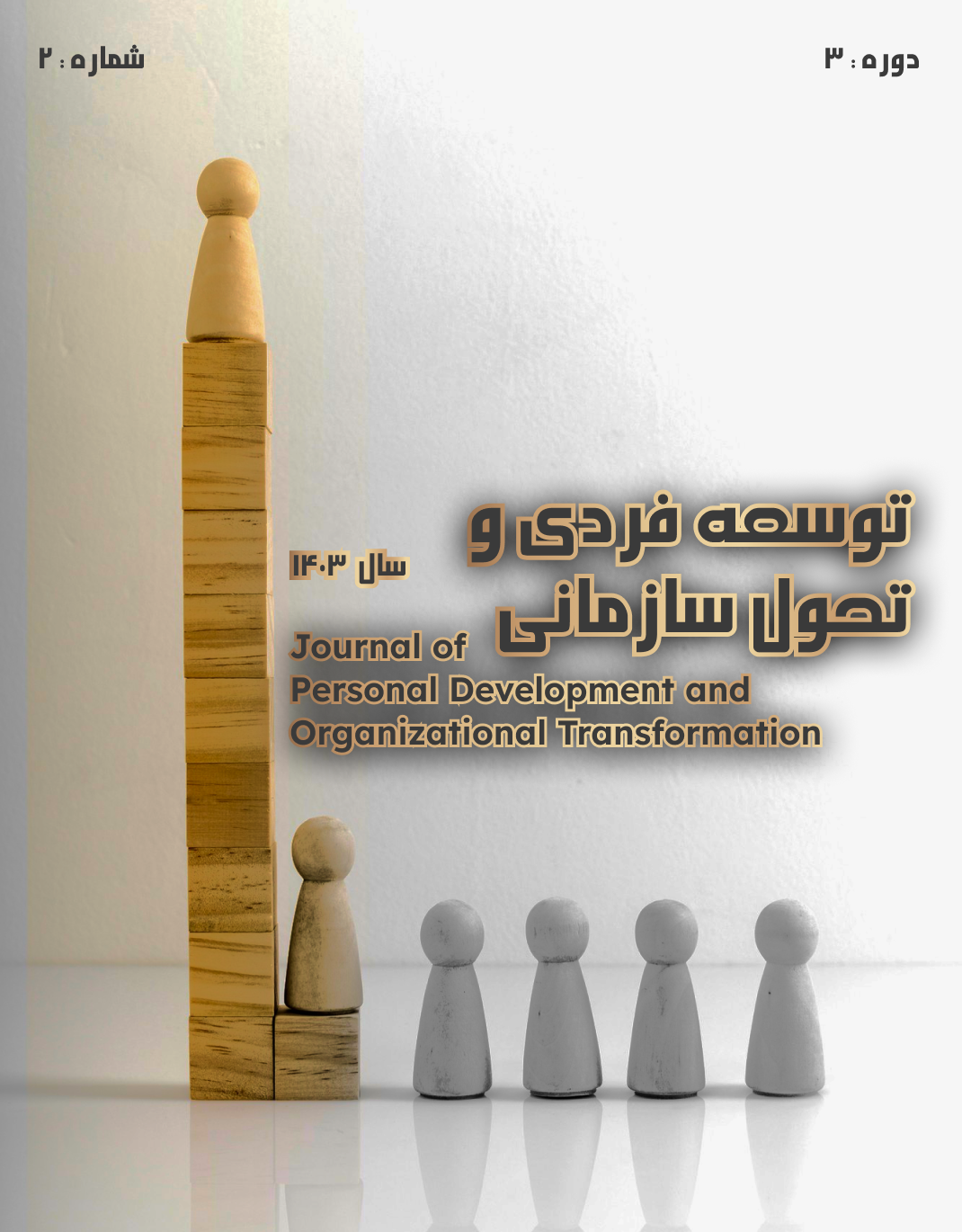شناسایی عوامل مؤثر بر هویت حرفهای با رویکرد برنامه درسی پنهان در دانشجویان
کلمات کلیدی:
هویت حرفه¬ای, برنامه درسی پنهان, تجربیات آموزشیچکیده
هدف این مطالعه بررسی عوامل مؤثر بر هویت حرفهای با رویکرد برنامه درسی پنهان دانشجویان دانشگاههای استان مازندران بود. پژوهش حاضر از نظر هدف، کاریردی و از نظر روش آمیخته (کیفی و کمی) میباشد. جامعه آماری در بخش کیفی شامل صاحب نظران و اساتید علوم تربیتی به تعداد 20 نفر و در بخش کمی شامل دانشجویان دانشگاههای استان مازندران به تعداد 47507 نفر بود. تعداد نمونه آماری در بخش کیفی 12 نفر و در بخش کمی بر اساس فرمول کوکران تعداد 380 نفر با روش نمونهگیری تصادفی طبقهای براساس حوزه دانشگاهی انتخاب شدند. در بخش کیفی این پژوهش از مصاحبههای نیمه ساختار یافته و در بخش کمی پرسشنامه محقق ساخته هویت حرفهای با رویکرد برنامه درسی پنهان استفاده شد که دارای 17 سوال و 1 بعد «شرایط علی» و یک مولفه (تجربیات آموزشی) بود. برای تحلیل دادههای کیفی در حین انجام مرحله کیفی از سه مرحله کدگذاری باز و کدگذاری محوری و کدگزاری گزینشی و در بخش کمی برای تجزیه و تحلیل دادهها، از آزمونهای تحلیل عاملی اکتشافی، تحلیل عاملی تاییدی و معادلات ساختاری استفاده شده است. نتایج نشان داد که تجربیات آموزشی به عنوان یک متغیر کلیدی در برنامه درسی پنهان، تأثیر عمدهای بر شکلگیری هویت حرفهای دانشجویان با ضریب 752/0 دارد. این مقدار بیانگر تأثیر متوسط تا قوی شرایط علی بر شکلگیری هویت حرفهای است. به طور کلی میتوان نتیجه گرفت که تجربیات آموزشی نقش بیبدیلی در شکلگیری، تقویت و جهتدهی به هویت حرفهای دانشجویان دارند. بنابراین، دانشگاهها و مؤسسات آموزشی باید با نگاهی دقیق و جامع، بهطور مستمر کیفیت این تجربیات را ارزیابی کرده و بسترهای مناسبی برای ارتقای آن فراهم آورند.
دانلودها
مراجع
Anegas, D. L., Pinner, R. S., Larrondo, I. D., & Branson, D. C. (2021). Funds of Professional Identity in Language Teacher Education: A Longitudinal S tudy on S tudent-Teachers Student trauma, the hidden curriculum, and cultural humility: This trio needs a team approach. Tesol Quarterly, 56(2), 445-473. https://doi.org/10.1002/tesq.3060 10.4018/978-1-7998-0319-5.ch005
Brouwer, J. (2021). What makes a nurse today? A debate on the nursing professional identity and its need for change. Nursing Philosophy, 22(2), e12343. https://doi.org/10.1111/nup.12343
Cruess, S. R., Cruess, R. L., & Steinert, Y. (2019). Supporting the development of a professional identity: general principles. Medical Teacher, 41(6), 641-649. https://doi.org/10.1080/0142159X.2018.1536260
Czerniawski, G. (2023). Professional development or professional learning: developing teacher educators' professional expertize. In R. J. Tierney, F. Rizvi, & K. Ercikan (Eds.), International Encyclopedia of Education (Fourth Edition) (pp. 469-474). Elsevier. https://doi.org/10.1016/B978-0-12-818630-5.04050-1
Dickinson, J., Fowler, A., & Griffiths, T. L. (2022). Pracademics? Exploring transitions and professional identities in higher educationJO - Studies in Higher Education. 47(2), 290-304. https://doi.org/10.1080/03075079.2020.1744123
Dur, Ş., Göl, İ., Erkin, Ö., & Yildiz, N. U. (2022). The effect of moral intelligence on cultural sensitivity in nurses. Perspectives in psychiatric care, 58(4), 2423-2432. https://doi.org/10.1111/ppc.13077
Gholampour, M., & Ayati, M. (2020). Factors affecting the development of a teacher's professional identity: A narrative-research of a teacher's life events. Journal of Educational Sciences, 27(2), 1-22. https://education.scu.ac.ir/article_16594.html
Jackson, D. (2017). Developing pre-professional identity in undergraduates through work-integrated learning. Higher Education, 74(5), 833-853. https://doi.org/10.1007/s10734-016-0080-2
Lee, M. Y., & Kutty, F. M. (2023). Emotional Intelligence and Professional Identity of Student Teachers During Practicum. International Journal of Academic Research in Business and Social Sciences, 13(4). https://doi.org/10.6007/ijarbss/v13-i4/16736
Li, X., Xiao, W., Sun, C., Li, W., & Sun, B. (2022). Does Burnout Decrease With Teacher Professional Identity Among Teachers in China? Journal of Career Development, 50(5), 983-996. https://doi.org/10.1177/08948453221138937
Mount, G. R., Kahlke, R., Melton, J., & Varpio, L. (2022). A critical review of professional identity formation interventions in medical education. Academic Medicine, 97(11S), S96-S106. https://doi.org/10.1097/ACM.0000000000004904
Sarraf-Yazdi, S., Teo, Y. N., How, A. E. H., Teo, Y. H., Goh, S., Kow, C. S., & Krishna, L. K. R. (2021). A scoping review of professional identity formation in undergraduate medical education. Journal of General Internal Medicine, 36(11), 3511-3521. https://doi.org/10.1007/s11606-021-07024-9
Toh, R. Q. E., Koh, K. K., Lua, J. K., Wong, R. S. M., Quah, E. L. Y., Panda, A., & Krishna, L. K. R. (2022). The role of mentoring, supervision, coaching, teaching and instruction on professional identity formation: a systematic scoping review. BMC Medical Education, 22(1), 531. https://doi.org/10.1186/s12909-022-03589-z
Tomlinson, M., & Jackson, D. (2021). Professional identity formation in contemporary higher education students. Studies in Higher Education, 46(4), 885-900. https://doi.org/10.1080/03075079.2019.1659763
Wang, Y., Xia, Q., Yue, H., & Teng, W. (2024). Chinese Rural Kindergarten Teachers’ Work–Family Conflict and Their Turnover Intention: The Role of Emotional Exhaustion and Professional Identity. Behavioral Sciences, 14(7), 597. https://doi.org/10.3390/bs14070597
Wu, J., Ghayas, S., Aziz, A., Adil, A., & Niazi, S. (2024). Relationship Between Teachers’ Professional Identity and Career Satisfaction Among College Teachers: Role of Career Calling. Frontiers in psychology, 15. https://doi.org/10.3389/fpsyg.2024.1348217
Yakov, G., Riskin, A., & Flugelman, A. A. (2021). Mechanisms involved in the formation of professional identity by medical students. Medical Teacher, 43(4), 428-438. https://doi.org/10.1080/0142159X.2020.1854706
Yao, X., Yu, L. A. U. S. Y., Kang, Z., & Wang, X. (2021). The role of self-efficacy in mediating between professional identity and self-reported competence among nursing students in the internship period: a quantitative studyJO - Nurse education in practice. 57, 103252. https://doi.org/10.1016/j.nepr.2021.103252
Zeng, L., Chen, Q., Fan, S., Yi, Q., An, W., Liu, H., & Huang, H. (2022). Factors influencing the professional identity of nursing interns: a cross-sectional study. BMC Nursing, 21(1), 200. https://doi.org/10.1186/s12912-022-00983-2
Zhao, Q. (2022). On the role of teachers' professional identity and well-being in their professional development. Frontiers in psychology, 13, 913708. https://doi.org/https://doi.org/10.3389/fpsyg.2022.913708
دانلود
چاپ شده
ارسال
بازنگری
پذیرش
شماره
نوع مقاله
مجوز
حق نشر 2025 زهرا کریم النفس , بابک حسین زاده, سیده زهرا حسینی درونکلائی (نویسنده)

این پروژه تحت مجوز بین المللی Creative Commons Attribution-NonCommercial 4.0 می باشد.







